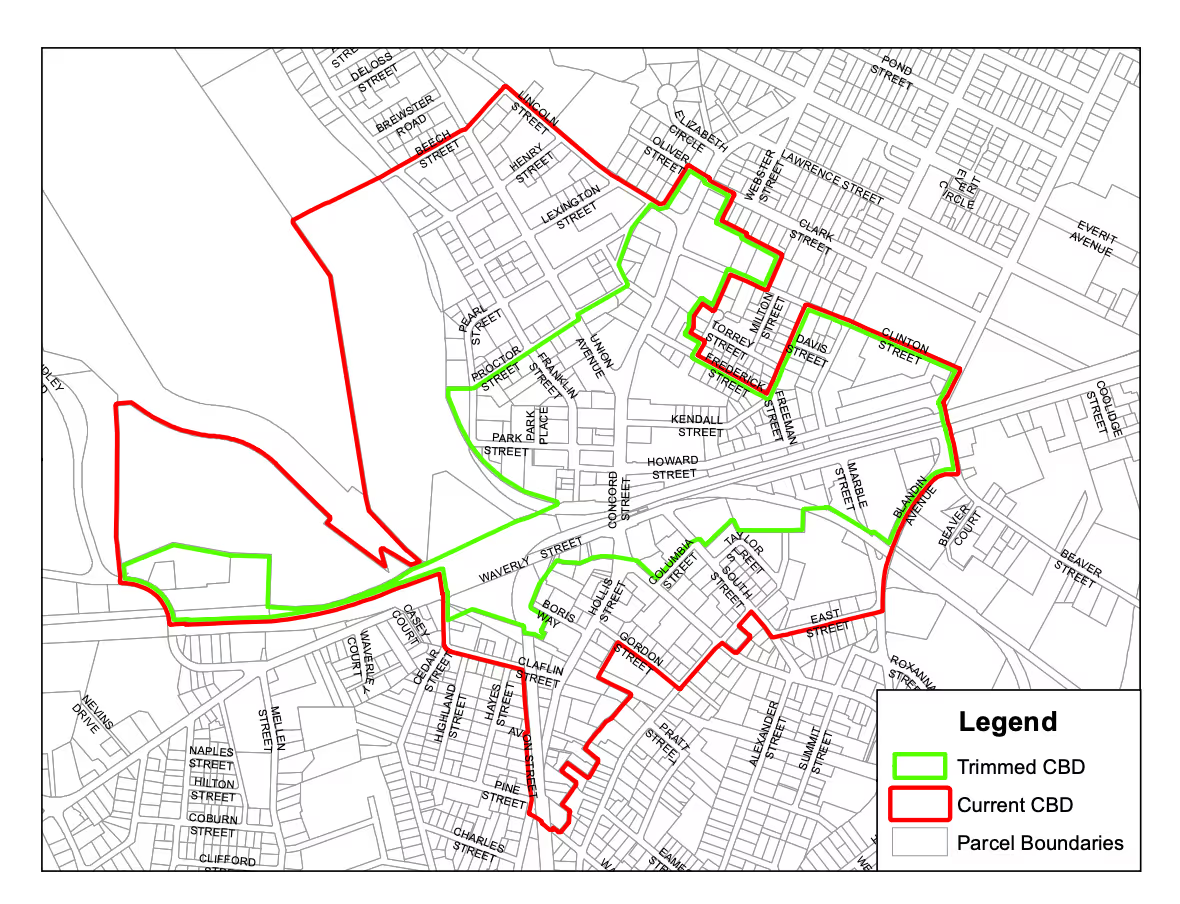Framingham officials will be going back to the drawing board in their attempt to gain full compliance with the MBTA Communities Act.
FRAMINGHAM - It’s back to the drawing board for potential changes to the downtown Central Business (CB) district map, as Framingham officials continue to work towards fully complying with the MBTA Communities Act.
For months, local officials have mulled options to gain full compliance with the statewide zoning law, which dictates that every city and town with MBTA service must provided at least one multi-family housing district within its zoning by right. Municipalities not in compliance with the law run the risk of missing out on state funding sources for local projects and initiatives.
At the start of 2025, Mayor Charlie Sisitsky’s submission of the CB district as an area to fulfill the act’s mandates was accepted by state officials, though certain conditions were set in place. Since then, Framingham officials have been trying to identify a way to gain full-time compliance.
Changes proposed in recent weeks would have resulted in reductions to the downtown district’s borders, mainly in the northwest from Beech Street down to Proctor Street and in the south up closer towards Waverly Street. Lower height limits for buildings, from six stories to four, have also been considered. The CB area plan that City Councilors had been presented with would have provided zoning for 4,375 units, which is just above the 4,355 needed for full MBTA Communities Act compliance.

Last month, the Framingham Planning Board voted to recommend no action on those CB district ideas. The Framingham Business Association, meanwhile, had urged the City Council to not change the height limit for newly constructed buildings, contending that increased density in the area would result in more business development and a higher tax base. However, some members of the legislative body—including Christine Long of District 1—have continued to advocated for CB District changes in order to ensure the city’s compliance with the state zoning law.
During the City Council’s meeting on Tuesday, June 3, though, Long noted that City Solicitor Kathryn Fallon Manupelli recently informed local officials about a legal opinion on the matter. In her letter released on June 2, Fallon Manupelli expressed her belief that since the Massachusetts Executive Office of Housing and Livable Communities granted conditional compliance through the full CB district as of January, any reductions or other changes to the district could potentially leave Framingham in a state of non-compliance with the MBTA Communities Act. That—in addition to what the solicitor deemed in her legal opinion as “deficiencies” in the public advertising throughout this process along with potential inconsistencies with enacting these changes—prompted Long to lament the lack of communication from the local Economic Development Department for not raising the issues sooner.
Still, Long made a motion to approve of the reduction of the CB district’s map only; her motion maintained the six-story limit for buildings.
“Six stories (would be) allowed,” Long explained at the Memorial Building on Tuesday, “but this shrinks (the CB District) down to the consolidated area where it does belong, and it takes it off of all these side streets that was spilling off into more residential neighborhoods.”
A two-thirds majority of the City Council—or eight votes—was required to enact those changes. A “no” vote to Long’s motion would have meant that the city would have to wait two years to find a resolution matter. With that, local legislators eventually moved to consider a motion to withdraw the CB district reduction plan; doing so would result in the topic being passed along to the group’s Planning and Zoning Subcommittee once more.
The conversation among City Councilors featured plenty of points regarding Framingham’s future related to housing, zoning, and affordability. With that, At-Large City Council member Janet Leombruno had still expected the body to be closer to a consensus on the MBTA Communities Act question after months of deliberations.
“I think that shrinking the district is a good idea,” Leombruno continued.
“My concern, though, is hearing that we may be out of compliance…And I’m also concerned, if enough councilors are going to be concerned about this, if we vote on this tonight—and it doesn’t pass—what’s going to happen to this.”
The motion to withdraw the latest CB district reduction plan was unanimously passed.
District 2 City Councilor Brandon Ward asked Framingham’s Director of Planning and Community Development Sarkis Sarkisian how long it would take to create a new CB district map that would ensure full-time compliance with the state zoning law. Sarkisian estimated that it would take a month; the deadline to submit a full-time compliance plan to Massachusetts officials is July 14. Ward made a motion—which also passed unanimously—to have a new map presented to the Planning and Zoning Subcommittee during their meeting on Monday, June 16.